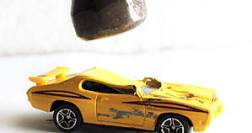Victoria's intention to mandate electronic stability systems and head airbags in all new cars from 2011 is an extremely noble and morally forthright move.
But for all the Victorian Government's good intentions, the plan may be overtaken by the technological pace of the car industry.
While many have applauded Victoria's move to implement mandatory stability controls in all new car sales in three years, the industry may take the wind out of the Garden State's sails by way of the sheer evolution of technological accessibility.
Many car companies already offer their entire range with stability controls as standard, and many more are on the road to implementing the active safety aids into their model line-up.
Victoria was the first government authority in the world to make it compulsory for seat belts to be fitted in vehicles in the 1960s.
The Queensland Government supports the stability control plan but stopped short of saying it would implement a similar plan here.
While any measures to make cars safer are welcomed, the Victorian initiative has the potential to alienate some sellers and buyers of cheap Chinese and Indian imports, many of which do not come with the electronic aids.
There is an argument that if these cheap and cheerful imports are not advanced enough to be equipped with the stability controls and all of their associated electronic safety programs, then they should not be on the market.
Queensland Transport Minister John Mickel has urged all manufacturers to add the electronic stability control (ESC) as standard.
“Queensland Transport has taken part in the ANCAP (Australian New Car Assessment Program) to ensure only vehicles with these ESC features achieve a five-star crash worthiness rating,” he said.
“I am also in the process of writing to vehicle manufacturers to encourage them to fit ESC as a standard feature on all new vehicles where appropriate.”
The RACQ, while endorsing any measure that improves safety on the road, says any mandate requiring manufacturers to specify cars to a certain standard is better done at a national level.
“Consumer level is the best way forward rather than forcing regulation, and anything they do is best done at the national level,” RACQ vehicle technologies manager Steve Spalding said.
“The intention by the Victorian Government to reduce the road toll is a positive step."
“But with the rate at which technology is moving, it may very well move past the regulations."
“It may also bring to the forefront that some car makers are de-specifying cars which may otherwise have stability systems fitted standard in other markets.”
The FCAI (Federal Chamber of Automotive Industries) shares the RACQ's view that while they fully support and encourage safety technology, any regulations with regard to active safety should be taken on a national level and not by a lone state.
Ford will have stability controls fitted as standard to its next generation FG Falcon, which will go on sale nationally in May.
Many car makers are in the throes of implementing stability features as standard across their product range.
Extensive studies have been done that prove cars fitted with stability controls are likely to be involved in single vehicle accidents up to 50 per cent less than those without.
There are compelling cases for stability to be standard on all new cars and most car manufacturers are angling toward implementing such features.
The Americans and Europeans are poised to mandate compulsory fitment of these systems on all cars around 2012.
Therefore many see it as a form of brinkmanship on Victoria's part because of that state's history with seat belts.
Mercedes became the first manufacturer in the world to fit ESP (Electronic Stability Programs) to all its models as standard.
Sensors monitor behaviour of the driver and the vehicle with data sent to a microprocessor.
Statistics produced in Europe indicated that Mercedes passenger cars were involved in serious road smashes far less than other brands since ESP was introduced in 1999.
The percentage of newly registered Mercedes-Benz cars involved in accidents dropped by almost 50 per cent in the first four years that the stability program had been in use.
Mickel says ESC was discussed comprehensively at the 2006 Queensland Road Safety Summit.
“Both Queensland Transport and I view it as a significant safety feature that has the potential to save lives,” Mickel said.
“Major insurance companies will also be approached with the suggestion that they review premiums to provide incentives for clients with ESC-equipped vehicles.”
How ESP works
If the rear of the car starts to slide out, engine power is reduced. If more intervention is needed to prevent the driver losing control, then the brakes are applied to the outer front wheel to stabilise the car.
In an understeer situation, when the car is driving straight on and not turning, the inside rear brake is applied.
Stability systems
DSC: Dynamic Stability Control (BMW, Jaguar, Ford, Mazda and Volvo).
PSM: Porsche Stability Management (Porsche).
VSC: Vehicle Stability Control (Toyota, Lexus, Subaru, Honda, Nissan and Alfa Romeo).
ESP: Electronic Stability Control (Mercedes-Benz, Audi, Volkswagen, Holden, Saab, Peugeot, Kia, Lamborghini, Ferrari, Hyundai and Citroen).





.jpg)


.jpg)
.jpg)
.jpg)

.jpg)

.jpg)








.jpg)
.jpg)



.jpg)



.jpg)